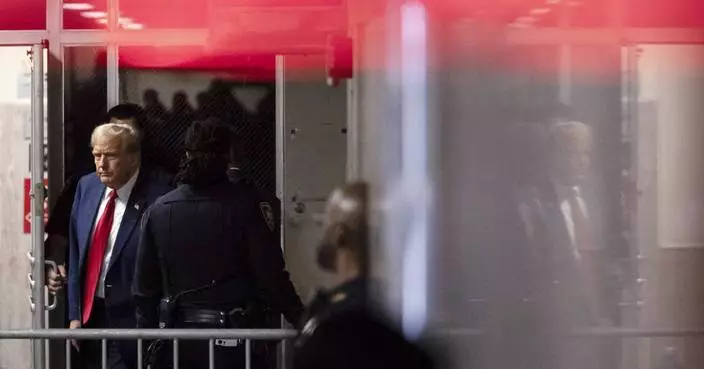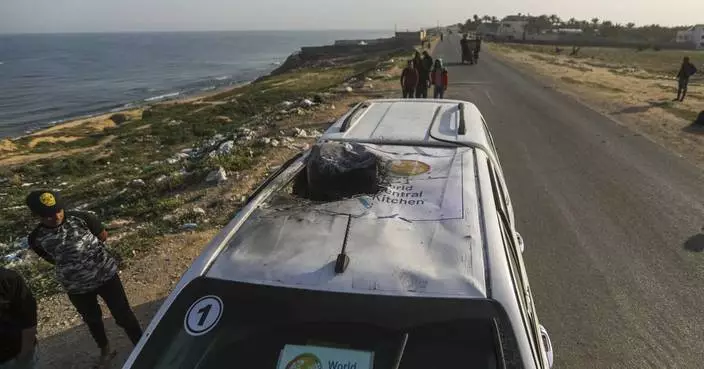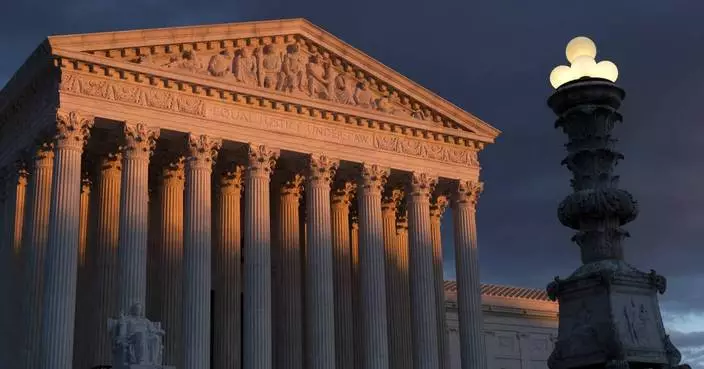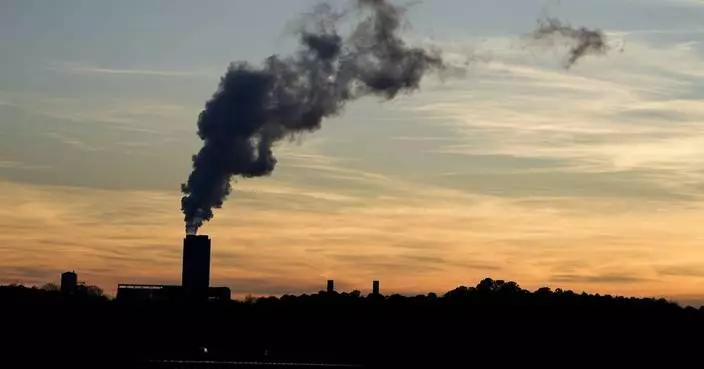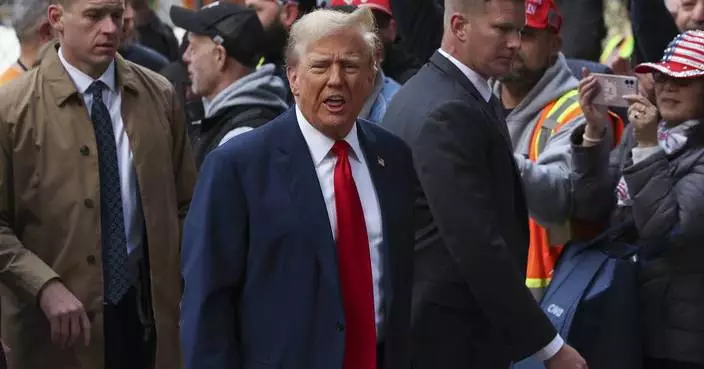President Donald Trump hosted several House Republican lawmakers at the White House on Monday to discuss an ultimately futile effort to block Congress from affirming President-elect Joe Biden's victory in the November election.
The meeting underscored Trump's refusal to accept the reality of his loss and his willingness to entertain undemocratic efforts to overturn the will of the majority of American voters. Biden will be sworn in as president on Jan. 20.
With no credible legal options remaining and the Electoral College having confirmed Biden's victory earlier this month, Trump is turning his attention to Jan. 6. That's when Congress participates in a count of the electoral votes, which Biden won 306-232.
The count, required by the Constitution, is generally a formality. But members can use the event to object to a state’s votes.
Rep. Mo Brooks, R-Ala., said he organized Monday's session with about a dozen House Republicans who are willing to challenge the results.
“President Trump is very supportive of our effort,” Brooks said in an interview late Monday.
With Democrats holding the House majority and several Republican senators now acknowledging Biden's victory, any effort to block congressional approval of the election appears sure to fail. Senate Majority Leader Mitch McConnell has warned his members against taking such a step.
Sen. John Thune, the No. 2 Senate Republican, urged lawmakers to remember that an effort to block the election results in Congress was “just not going anywhere.”
“I mean, in the Senate, it would go down like a shot dog," Thune told CNN. "I just don’t think that it makes a lot of sense to put everybody through this when you know what the ultimate outcome is gonna be.”
Still, Trump has continued to dangle the possibility of congressional intervention.
Brooks said Monday's White House meeting was originally scheduled for about an hour, but lasted for three hours, with Trump participating for much of it. Other attendees including Trump's personal lawyer, Rudy Giuliani, who has spent the weeks since the election promoting false claims of voter fraud.
Brooks said he also met with Vice President Mike Pence. As president of the Senate, Pence is to preside over the Jan. 6 session and declare the winner.
Brooks said the group is making plans to challenge the election results from Michigan, Wisconsin, Pennsylvania, Georgia and Nevada, all battleground states Biden carried. Brooks in particular has raised questions about the way state elections were conducted this year, with some having made changes to ballots and procedures during the pandemic. While the new procedures may have led to confusion in some states, state and federal officials have said there was no credible evidence of widespread fraud.
Still, Trump's top aides, including chief of staff Mark Meadows, continued on Monday to push false claims of election malfeasance, without providing any evidence.
A range of nonpartisan election officials and Republicans have confirmed that there was no fraud in the November contest that would change the results of the election. That includes Attorney General William Barr, who on Monday said he saw no reason to appoint a special counsel to look into the president’s claims about the 2020 election. Trump has discussed doing so with some of his advisers.
Trump and his allies have filed roughly 50 lawsuits challenging election results, and nearly all have been dismissed or dropped. He’s also lost twice at the U.S. Supreme Court.
With no further tenable legal recourse, Trump has been fuming and peppering allies for options as he refuses to accept his loss.
On Jan. 6, a lawmaker can object to a state’s votes on any grounds. The objection will not be heard unless it is in writing and signed by both a member of the House and a member of the Senate.
If there is such a joint request, then the joint session suspends and the House and Senate go into separate sessions to consider it. For the objection to be sustained, both chambers must agree to it by a simple majority vote. If they disagree, the original electoral votes are counted.
The last time such an objection was considered was 2005, when Rep. Stephanie Tubbs Jones of Ohio and Sen. Barbara Boxer of California, both Democrats, objected to Ohio’s electoral votes by claiming there were voting irregularities. Both chambers debated the objection and rejected it. It was only the second time such a vote had occurred.
McConnell has told Senate Republicans that a dispute over the results in January would yield a “terrible vote” for Republicans. They would have to choose whether to back Trump or publicly buck him.
Associated Press writer Mary Clare Jalonick contributed to this report.
WASHINGTON (AP) — The U.S. Supreme Court on Thursday took up Donald Trump's bid to avoid prosecution over his efforts to overturn his 2020 election loss to Democrat Joe Biden.
Trump’s lawyers argue that former presidents are entitled to absolute immunity for their official acts. Otherwise, they say, politically motivated prosecutions of former occupants of the Oval Office would become routine and presidents couldn’t function as the commander in chief if they had to worry about criminal charges.
Lower courts have rejected those arguments, including a unanimous three-judge panel on an appeals court in Washington. And even if the high court resoundingly follows suit, the timing of its decision may be as important as the outcome.
That’s because Trump, the presumptive 2024 Republican presidential nominee, has been pushing to delay the trial until after the November election, and the later the justices issue their decision, the more likely he is to succeed.
The court typically issues its last opinions by the end of June, which is roughly four months before the election.
Currently:
What to listen for during Supreme Court arguments on Donald Trump and presidential immunity
The Supreme Court will decide whether Trump is immune from federal prosecution. Here’s what’s next
What to know in the Supreme Court case about immunity for former President Trump
Trump is in New York for the hush money trial while the Supreme Court hears his immunity case in DC
Follow the AP’s coverage of the U.S. Supreme Court at https://apnews.com/hub/us-supreme-court
Here's the latest:
In oral arguments that have involved a lot of elevated legal jargon, the Supreme Court justices also sneaked in a few fun metaphors Thursday during Donald Trump’s bid to avoid prosecution over his efforts to overturn his 2020 election loss to Joe Biden.
Striking a skeptical note while questioning Trump lawyer D. John Sauer, Chief Justice John Roberts argued that expunging from the indictment acts that are official rather than personal would hobble the case, making it a “one-legged stool.”
Later, in conversation with special counsel team lawyer Michael Dreeben, Justice Samuel Alito brought up “the old saw about indicting a ham sandwich.” He was referring to the belief that indictments are easy to secure, and that they don’t necessarily indicate any likelihood of guilt.
Alito asked Dreeben whether he had come across a lot of cases in which a federal prosecutor wanted to indict a case and the grand jury refused. Dreeben said there are such cases, before Alito cut him off.
“Every once in a while there’s an eclipse, too,” Alito said, drawing some laughs in the courtroom.
The team under Special Counsel Jack Smith, which wrote that a lack of previous criminal charges “underscores the unprecedented nature” of what Donald Trump is accused of, is up before the Supreme Court in Trump's bid to avoid prosecution over his efforts to overturn his 2020 election loss to Democrat Joe Biden.
Michael Dreeben, a lawyer for the Smith team, said the court has never before recognized absolute immunity for a former president. “Such presidential immunity,” he said, “has no foundation in the Constitution.”
Justice Clarence Thomas asked Dreeben whether he was saying that there was no immunity even for official acts.
Dreeben said yes and also that impeachment and conviction before the Senate is not a prerequisite for a courtroom prosecution. Dreeben said there are plenty of checks to prevent politically motivated prosecutions.
Thomas said that other presidential acts in the past would have seemed ripe for prosecution and yet none occurred. Dreeben responded that the core distinction is that those other acts were not crimes.
Dreeben said the Smith team was not endorsing a system in which presidents would be exposed to prosecution for mistakes or bad judgments.
Justice Neil Gorsuch posed a line of questions Thursday that appeared friendly to arguments by Trump's lawyers in his bid to avoid prosecution over his efforts to overturn his 2020 election loss to Democrat Joe Biden.
Gorsuch suggested that if presidents fear they could be prosecuted after they leave office, they could begin preemptively pardoning themselves.
“We’ve never answered whether a president can do that. And happily, it’s never been presented to us,” he said.
But Justice Amy Coney Barrett took issue with a key argument of the Trump team — that under the Constitution, former presidents must be impeached and convicted before the Senate before they can be prosecuted in court.
Barrett said no one has ever suggested the justices would need to be impeached and convicted before they could be prosecuted. Trump lawyer D. John Sauer responded that under the Constitution, the sequence is only mandatory as it relates to former presidents.
Some Supreme Court justices posed scenarios or expressed skepticism Thursday as arguments started in Donald Trump’s bid to avoid prosecution over his efforts to overturn his 2020 election loss to Democrat Joe Biden.
Conservative Justice Samuel Alito said he considered it “implausible” that a president could legally order Navy SEALs to order the assassination of a political rival. That skepticism matters because the hypothetical is something the Trump team, which includes attorney D. John Sauer, has suggested could theoretically be protected from prosecution.
Conservative Justice Amy Coney Barrett asked Sauer a question that cut to the heart of the case, reading aloud allegations from the indictment and asking him to respond whether Trump’s actions in each instance were private or official.
Trump’s attorneys concede that immunity does not extend to personal actions but instead protects official acts. Sauer said he believed most of the acts are unquestionably official.
Chief Justice John Roberts, who could be a key swing vote, struck a skeptical note about the idea of expunging from the indictment acts that are official rather than personal, saying such a move would render the case a “one-legged stool.”
Liberal Justice Ketanji Brown Jackson said Sauer was asking for a change in the immunity law. She raised Richard Nixon’s pardon, asking, “I think that if everybody thought that presidents couldn’t be prosecuted, then what was that about?"
Liberal Justice Elena Kagan noted the Founding Fathers did not insert an immunity clause for presidents into the Constitution — but, she said, “they knew how to.”
Supreme Court Justice Clarence Thomas pressed Donald Trump's lawyer D. John Sauer at the outset of arguments Thursday, asking where the principle of absolute immunity comes from.
The question was the first during arguments at the Supreme Court in Trump’s bid to avoid prosecution over his efforts to overturn his 2020 election loss to Democrat Joe Biden.
Sauer fell back quickly on a Supreme Court case that’s core to the defense — a 1982 decision that held that former presidents are immune from civil lawsuits.
A skeptical Justice Sonia Sotomayor pointedly noted to Sauer that the indictment alleges that Trump acted for personal gain.
She said the Founding Fathers had contemplated the idea of immunity for presidents but had explicitly decided against it.
She made clear her opposition to the Trump legal team’s position, saying she was having a hard time envisioning immunity for a president who creates and submits false documents, orders the assassination of a political rival, and any number of other criminal acts.
First up on Thursday was D. John Sauer, making Donald Trump’s argument that he’s immune from criminal prosecution. A former Missouri solicitor general and onetime Supreme Court clerk, Sauer also represented Trump at the appeals court level.
Trump went to those arguments even though he wasn’t required to be there, but he won’t be in the audience at the Supreme Court today. He’s required to be in New York for his hush money trial.
About 30 demonstrators gathered outside the Supreme Court before arguments, some wearing judicial robes with kangaroo masks and others holding signs like “Justice Delayed Is Justice Denied.” That’s an apparent reference to the the timing of the high court’s ultimate decision in the case, which could determine whether a trial can be held before the election in November.
Shortly before arguments were slated to begin, Trump fired off a few posts Thursday on his social media network.
In one, he declared in all caps, “WITHOUT PRESIDENTIAL IMMUNITY, IT WOULD BE IMPOSSIBLE FOR A PRESIDENT TO PROPERLY FUNCTION, PUTTING THE UNITED STATES OF AMERICA IN GREAT AND EVERLASTING DANGER!”
Trump also said that without immunity, a president would just be “ceremonial” and the opposing political party “can extort and blackmail the President by saying that, ‘if you don’t give us everything we want, we will Indict you for things you did while in Office,’ even if everything done was totally Legal and Appropriate.”
Of the nine justices hearing the case, three were nominated by Trump — Amy Coney Barrett, Neil Gorsuch and Brett Kavanaugh. But it’s the presence of a justice confirmed decades before Trump’s presidency, Justice Clarence Thomas, that’s generated the most controversy.
Thomas’s wife, Ginni Thomas, urged the reversal of the 2020 election results and then attended the rally that preceded the Capitol riot. That has prompted calls for the justice to step aside from several court cases involving Trump and Jan. 6.
But Thomas has ignored the calls, taking part in the unanimous court decision that found states cannot kick Trump off the ballot as well as last week’s arguments over whether prosecutors can use a particular obstruction charge against Capitol riot defendants.
The justices will probably meet in private a short time after arguments to take a preliminary vote on the outcome. Chief Justice John Roberts would be a prime candidate to take on the opinion for the court, assuming he is in the majority.
They could simply reject Trump’s immunity claim outright, permitting the prosecution to move forward and returning the case to U.S. District Judge Tanya Chutkan to set a trial date.
They could also reverse the lower courts by declaring for the first time that former presidents may not be prosecuted for conduct related to official acts during their time in office. Such a decision would stop the prosecution in its tracks.
There are other options, too, including ruling that former presidents do retain some immunity for their official actions but that, wherever that line is drawn, Trump’s actions fall way beyond it.
Yet another possibility is that the court sends the case back to Chutkan with an assignment to decide whether the actions Trump is alleged to have taken to stay in power constitute official acts.
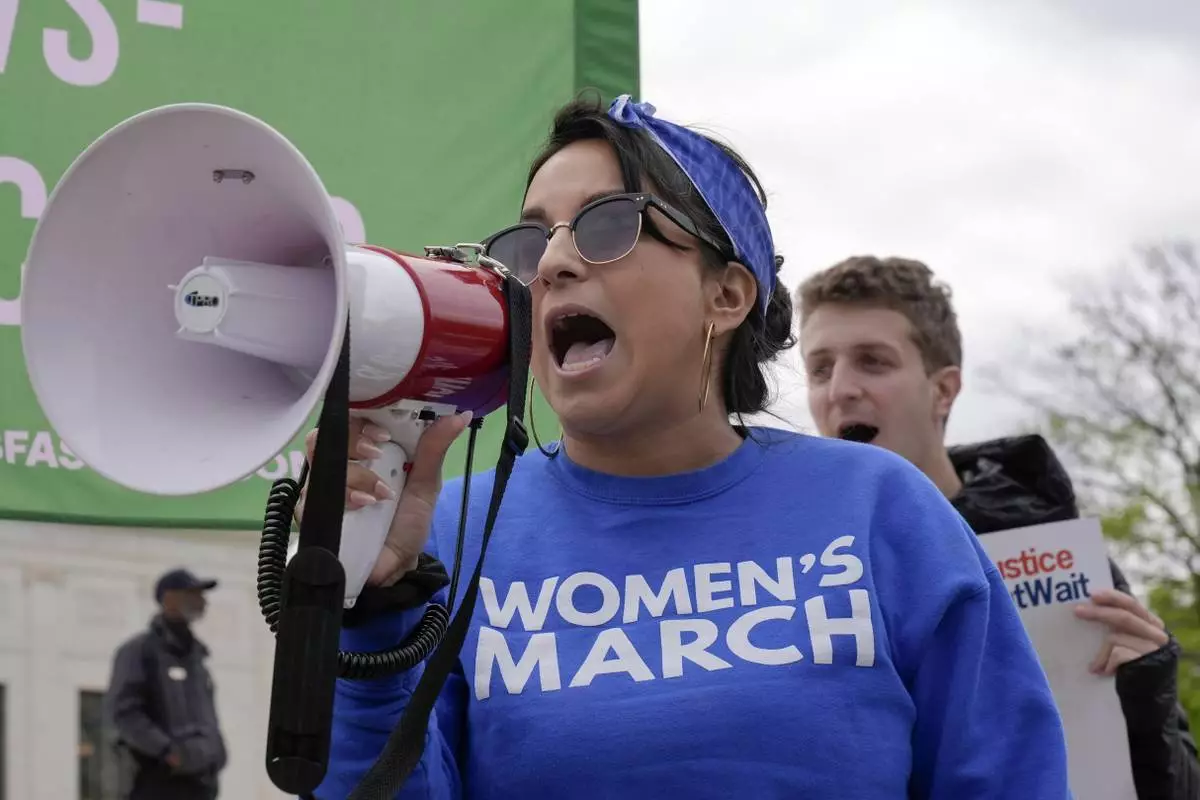
Demonstrators protest outside the Supreme Court as the justices prepare to hear arguments over whether Donald Trump is immune from prosecution in a case charging him with plotting to overturn the results of the 2020 presidential election, on Capitol Hill Thursday, April 25, 2024, in Washington. (AP Photo/Mariam Zuhaib)
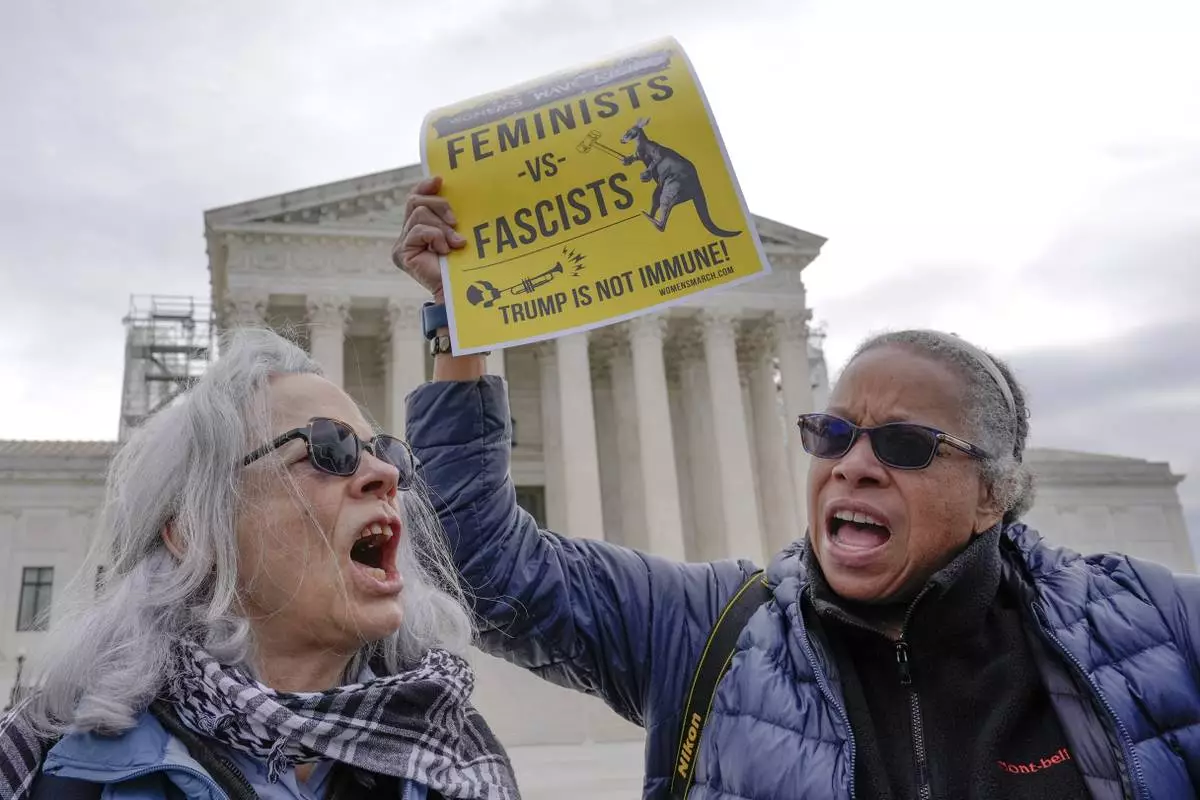
Demonstrators protest outside the Supreme Court as the justices prepare to hear arguments over whether Donald Trump is immune from prosecution in a case charging him with plotting to overturn the results of the 2020 presidential election, on Capitol Hill Thursday, April 25, 2024, in Washington. (AP Photo/Mariam Zuhaib)
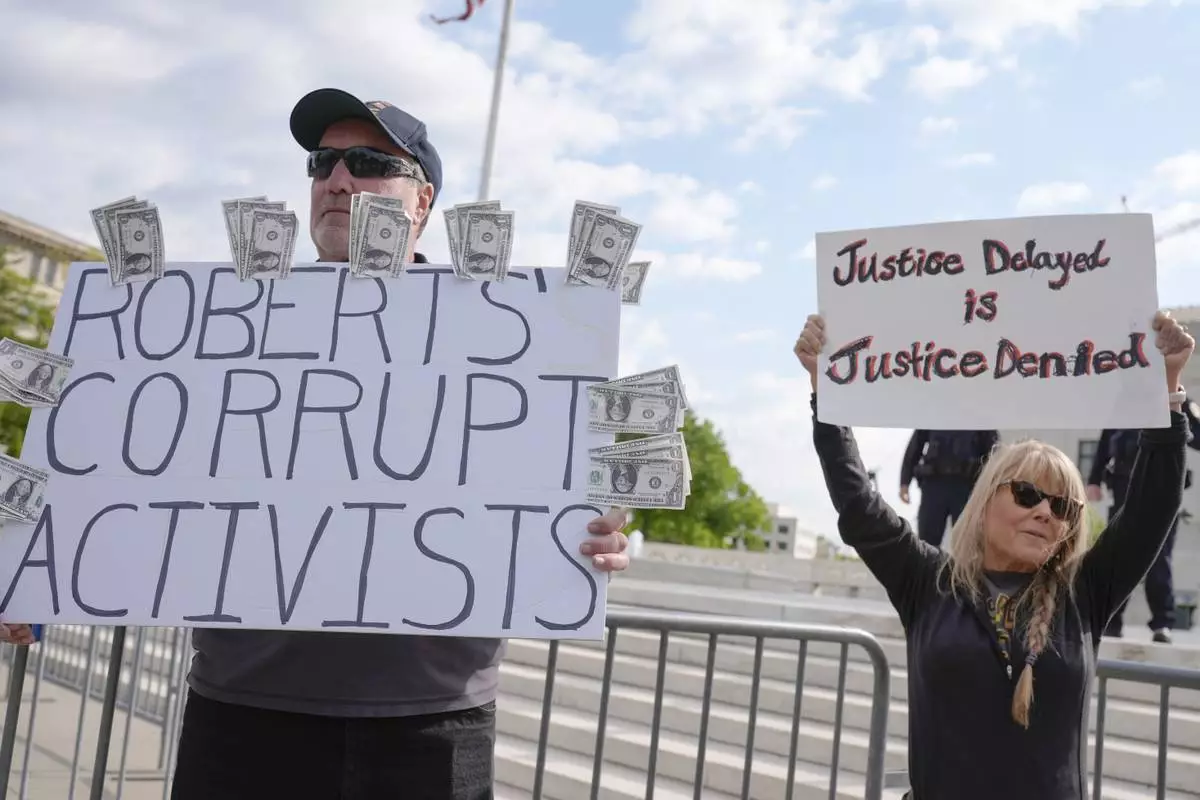
Demonstrates stand outside the Supreme Court as the justices prepare to hear arguments over whether Donald Trump is immune from prosecution in a case charging him with plotting to overturn the results of the 2020 presidential election, on Capitol Hill Thursday, April 25, 2024, in Washington. (AP Photo/Mariam Zuhaib)
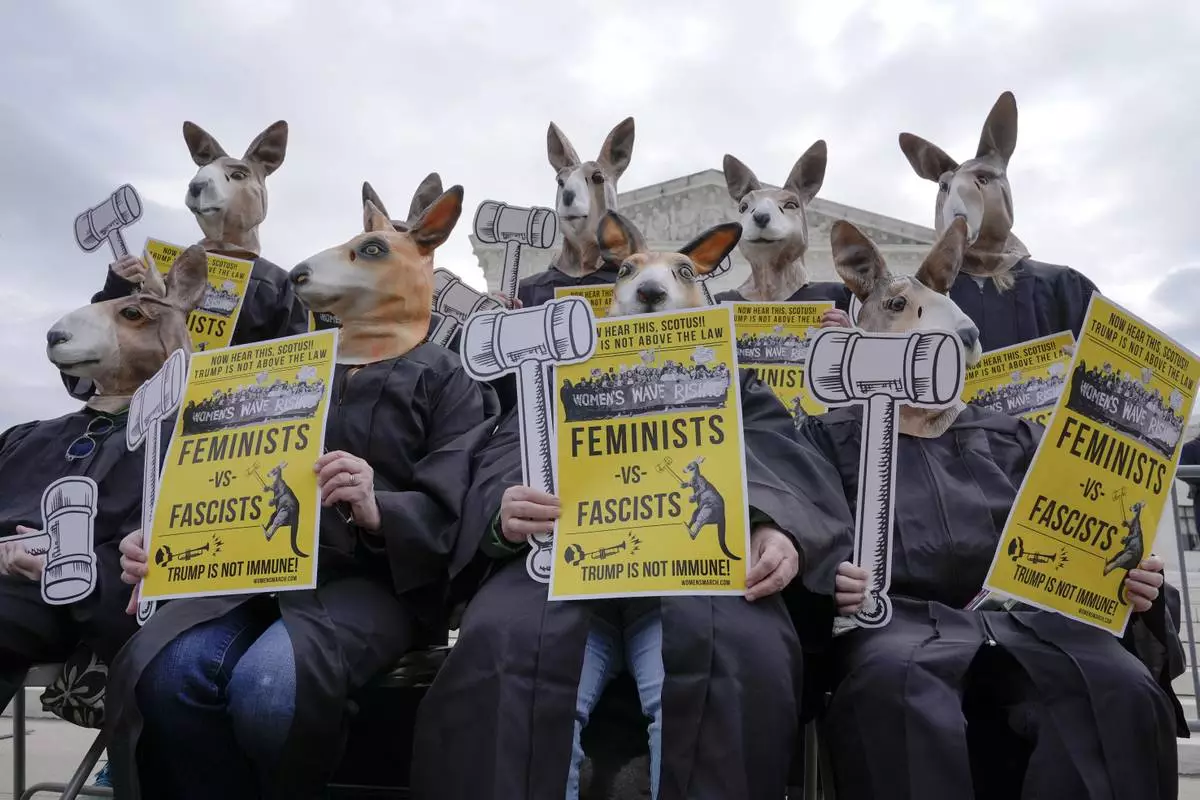
Demonstrates stand outside the Supreme Court as the justices prepare to hear arguments over whether Donald Trump is immune from prosecution in a case charging him with plotting to overturn the results of the 2020 presidential election, on Capitol Hill Thursday, April 25, 2024, in Washington. (AP Photo/Mariam Zuhaib)
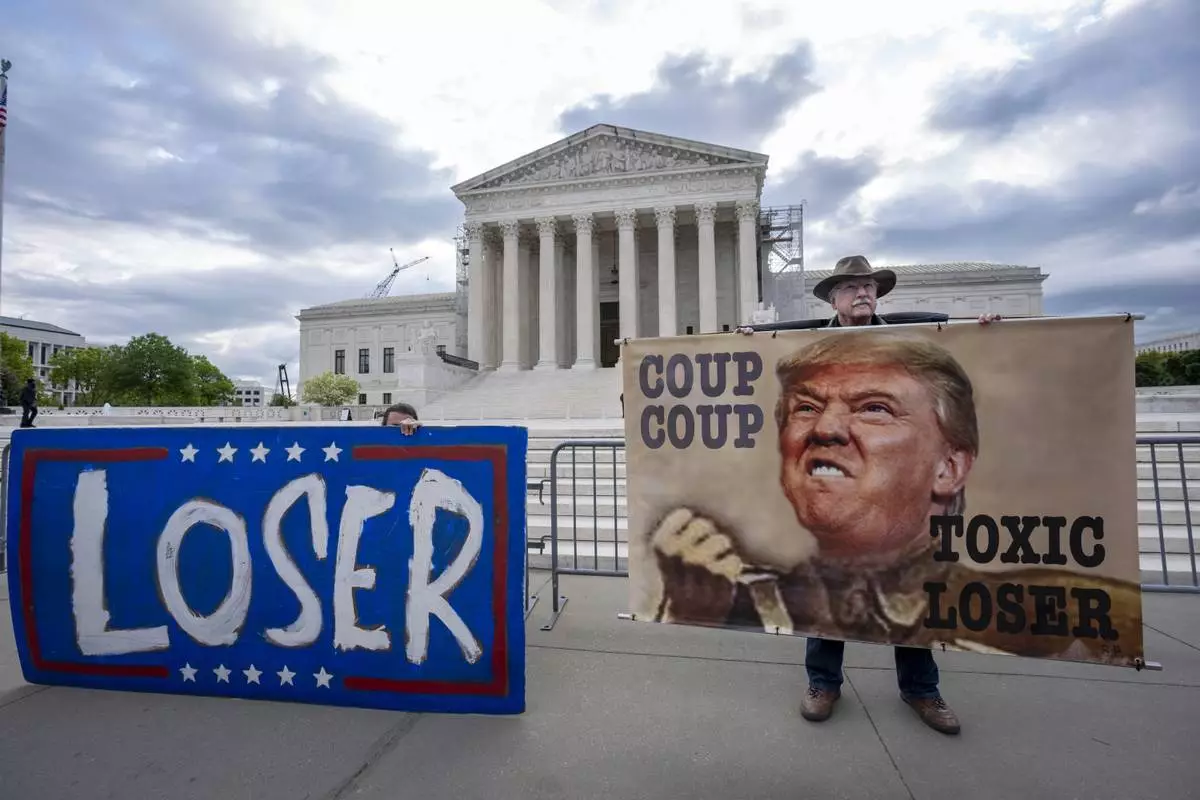
Activist Stephen Parlato of Boulder, Colo., right, joins other protesters outside the Supreme Court as the justices prepare to hear arguments over whether Donald Trump is immune from prosecution in a case charging him with plotting to overturn the results of the 2020 presidential election, on Capitol Hill in Washington, Thursday, April 25, 2024. (AP Photo/J. Scott Applewhite)








